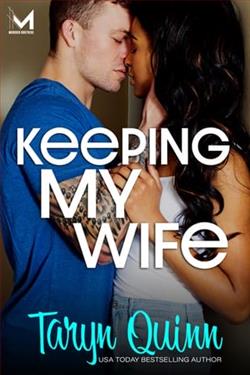Page 66 of Tainted Tempos
“I made you some tea.” He walks over and places the mug on the nightstand in his guest bedroom.
“Thanks for letting me stay here.” I lean against the headboard.
Regret sweeps his expression, and he looks tired. Old. Beat down by a once glamorous life. Sometimes, I see the charismatic, larger-than-life man from my childhood. But more often, I’ve witnessed this new version. He still gets up when life beats him down, but now, he’s slower.
“You’re always welcome, Mckenna,” he admits, his tone gruff. He sits down in the chair by the window and removes his glasses. He cleans them with the hem of his shirt. The morning light highlights the two imprints from the nose pads on the bridge of his nose. “I wish you knew that, but I guess that’s my fault.”
I arch an eyebrow, surprised by his accepting any blame. Even if it’s only a slice. Even if he “almost” feels bad about it.
Dad sighs again before slipping his glasses back on. “Look, Mckenna, I recognize that our relationship isn’t what it should be. I know I’ve let you down. I spent so many years focused on work and let your mother take the lead with you. Then, with the divorce and everything that followed, I wrongly assumed that you and she would be a united front. Instead, we both left you out in the cold, and I was too damn stubborn to see it. I’m sorry, kid. Seeing you like this…” He gestures a hand in my direction. “Watching you suffer, knowing you were dating a rockstar and I had no damn clue…” Dad pauses again and shakes his head miserably. “I missed your wedding. I didn’t even know you got married until Jeannie saw the magazine headline.”
“I like her. A lot,” I admit.
Dad smiles at that. “She’s special.”
“Yeah.”
His smile falls and his eyes narrow. “But I failed you, Kenny. And I’m sorry.”
His words wash over me like a salve, blanching some of the sting I’ve carried around since my 1L year. “I always felt like an afterthought.”
Dad winces.
“You and Mom left me to fend for myself.”
His eyes widen at that. His mouth drops open, and I continue talking to head him off.
“I don’t mean with material things. I was always well provided for. Until your divorce. I mean, you both forgot to pay tuition or assumed the other parent was taking care of it.” For years, I wanted to have this conversation with Dad. But after my first few attempts were met with silence, I stopped trying. Instead, I started harboring guilt and resentment and bitterness.
Right now, I’m too exhausted to sit and stew in any negative feelings. I don’t care anymore what Dad’s reaction will be. I’m clearing my mind, getting things off my chest, and lettingthe chips fall where they may. Forgetting tuition payments, cancelling dinner plans, skipping holidays—none of it seems that important right now.
I’m nearly numb to the feelings that once held my body prisoner. Instead, I speak freely. My tone borders on monotonous. I present the facts of this case—my life—with something akin to detachment.
“What?” Dad gasps, looking horrified.
“You and Mom, you never gave me time. You never got to know me. You never showed that you cared.” The missed violin concerts, the forgotten birthdays, the emails from the Bursar’s Office, the lack of Christmas dinner invites…
Those memories, coupled with the sadness and pain associated with them, flicker through my mind. They fan out, recalling other injustices and wounds. They shake me from my indifference and the backs of my eyes sting.
I avert my gaze and work a swallow. My throat, previously dry, now feels tight and sore.
My former disinterest has blistered into pain. Years of layered hurts bubble to the surface. I feel raw and hollow. Like my insides and all the emotions I keep locked down are on full display. Vulnerability claws at my throat, fighting to say its piece, while a part of me tries to swallow it back.
Don’t show weakness. Don’t cry.
Dad clears his throat and when I look at him, I catch him rubbing his eyes. Not in dismissive frustration but in genuine sorrow. “I care, Mckenna. I’m sorrier than you’ll ever know,” Dad says, owning his part full on. His voice rattles with regret, and I read his sincerity in the dip of his brows, in the intensity of his gaze. “Give me a shot to make it up to you. Please.”
“What?” I shake my head. “How?—”
“Stay here. Let me settle your tuition.”
I wave a hand. “It’s been taken care of.”
“How?” he asks. Then, he shakes his head as if realizing that my husband can settle my tuition with a phone call. “Okay, tell me why you’re here then, at my place? Why aren’t you home with Maverick?” He crosses his arms over his chest. He looks like the dad from my high school years. Stern and formidable. He’s back in his lane, away from the emotional messiness. He wants facts.
I snort, realizing that we’re more alike than I thought. This turn in the conversation feels more natural for me, too.
“Are you sure you want to know?”















